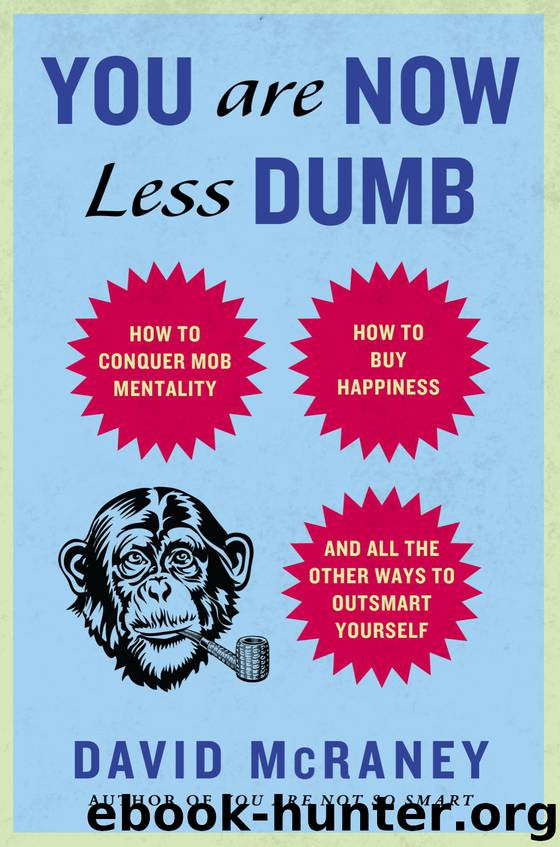You Are Now Less Dumb by David McRaney

Author:David McRaney
Language: eng
Format: epub
Publisher: Penguin Group US
Published: 2013-06-23T16:00:00+00:00
10.
Pluralistic Ignorance
THE MISCONCEPTION: Many of your private beliefs are in disagreement with what most people think.
THE TRUTH: On certain issues, the majority of the people believe that the majority of the people in a group believe what, in truth, the minority of the members believe.
Have you ever been befuddled in a classroom, or a business meeting, or an intervention, and when the person running the show asks, “Okay, raise your hand if you don’t understand,” you pass on the opportunity to clear up your confusion? Why do you do that?
When a person asks a question this way—say, a professor in an algebra course—she is unwittingly conjuring up a psychological phenomenon that has diverted the lives of millions going back to the first humans. You are probably familiar with what follows the moment an instructor asks, “Show of hands, who is confused?” You usually pause for three seconds, frantically dart your eyes around the room, and decide you must be the only person who has no idea what is going on and then decide to keep your hand right where it is. After a few more seconds, the teacher says, “Okay, great. Moving on . . .”
If you could have moved into the minds of your classmates, you would have seen that most of them also had no clue, and that they, too, waited to see if they were alone and then did nothing. In a situation like this, a wave of insecure uncertainty passes through the collective, with all persons wondering if they are alone in their confusion. Each person then refuses to act because she fears the hundred-eye gaze of disrespect that might turn toward her. The result is a totally inaccurate view of reality in which everyone thinks she knows what the majority is thinking, and each person believes she is in the mental minority. In the end, the ignorance is telepathically transferred to the teacher, who moves on to new material thinking her classroom is particularly sharp and her technique brilliant. The topics of the day may have been clarified for you, and your grade might have improved because of it, if not for a nasty little booger called pluralistic ignorance. To understand how it dominates other aspects of your life, we must first explore some basic sociology.
As the philosopher Terence McKenna liked to say, cultures are operating systems for brains. To continue the metaphor—the shared beliefs, values, and norms of your society are the software running on the hardware in your head. Of course, the hardware in your head isn’t hard; it’s a goopy undercooked flan of neurons and supportive cells, but you get the idea. You come hardwired for all sorts of situations, but that hardware gets modified, enhanced, suppressed, and rerouted by the cultural milieu into which you were born. Beliefs are the things most people believe to be true. Values are the interpretation of what is right and wrong, important and silly, ethical and unethical. Norms, though, have the most influence on your actions and thoughts.
Download
This site does not store any files on its server. We only index and link to content provided by other sites. Please contact the content providers to delete copyright contents if any and email us, we'll remove relevant links or contents immediately.
Spell It Out by David Crystal(36116)
Professional Troublemaker by Luvvie Ajayi Jones(29661)
The Secret History by Donna Tartt(19082)
We're Going to Need More Wine by Gabrielle Union(19045)
Cat's cradle by Kurt Vonnegut(15351)
The Goal (Off-Campus #4) by Elle Kennedy(13671)
The Social Justice Warrior Handbook by Lisa De Pasquale(12190)
The Break by Marian Keyes(9366)
Crazy Rich Asians by Kevin Kwan(9290)
The remains of the day by Kazuo Ishiguro(8997)
Thirteen Reasons Why by Jay Asher(8907)
Educated by Tara Westover(8053)
The handmaid's tale by Margaret Atwood(7762)
Giovanni's Room by James Baldwin(7345)
Win Bigly by Scott Adams(7194)
This Is How You Lose Her by Junot Diaz(6885)
The Rosie Project by Graeme Simsion(6412)
Six Wakes by Mur Lafferty(6256)
The Power of Now: A Guide to Spiritual Enlightenment by Eckhart Tolle(5781)
